Charles E W Bean, Diaries, AWM38 3DRL 606/244/1 - 1916 - 1933 - Part 4
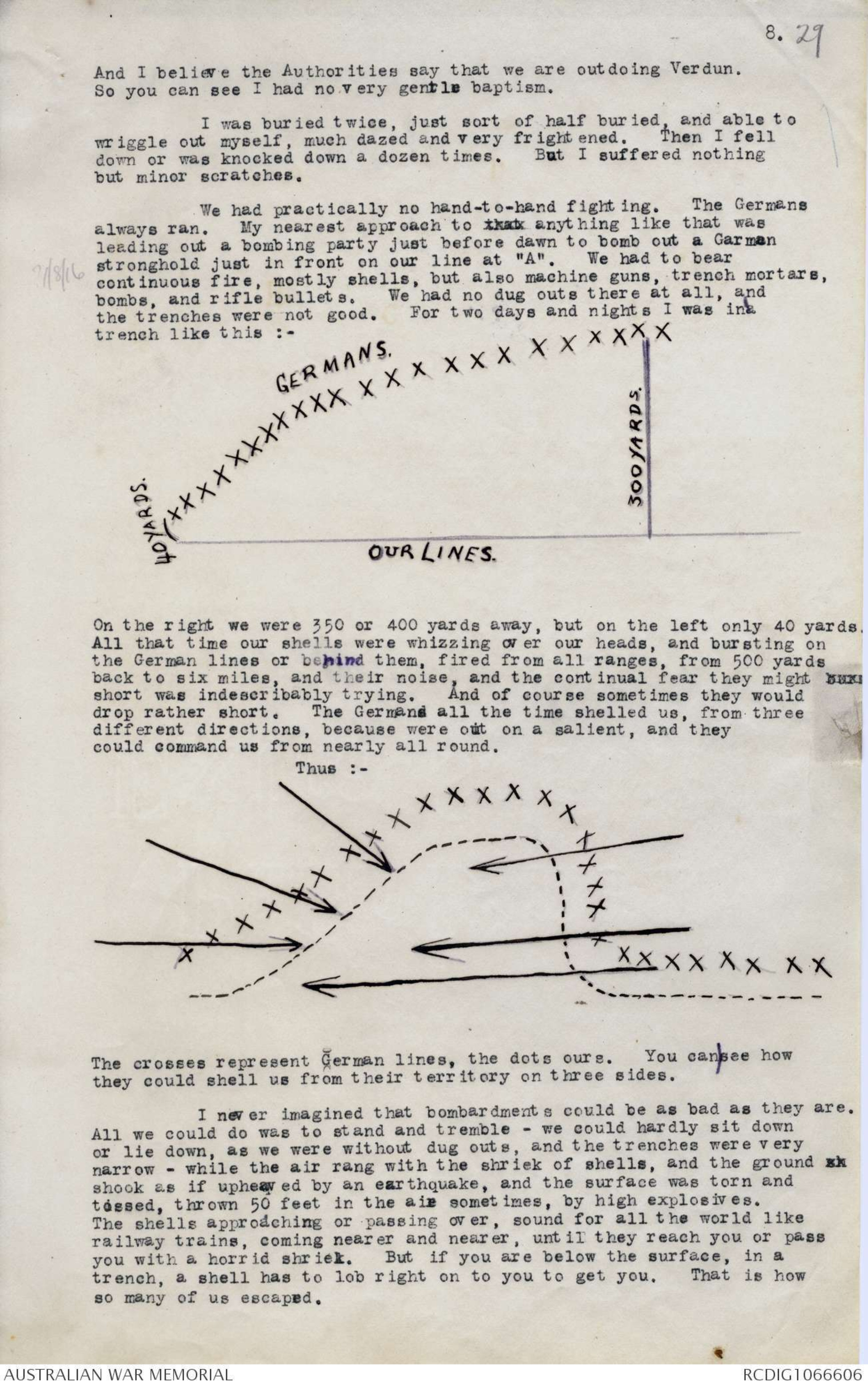
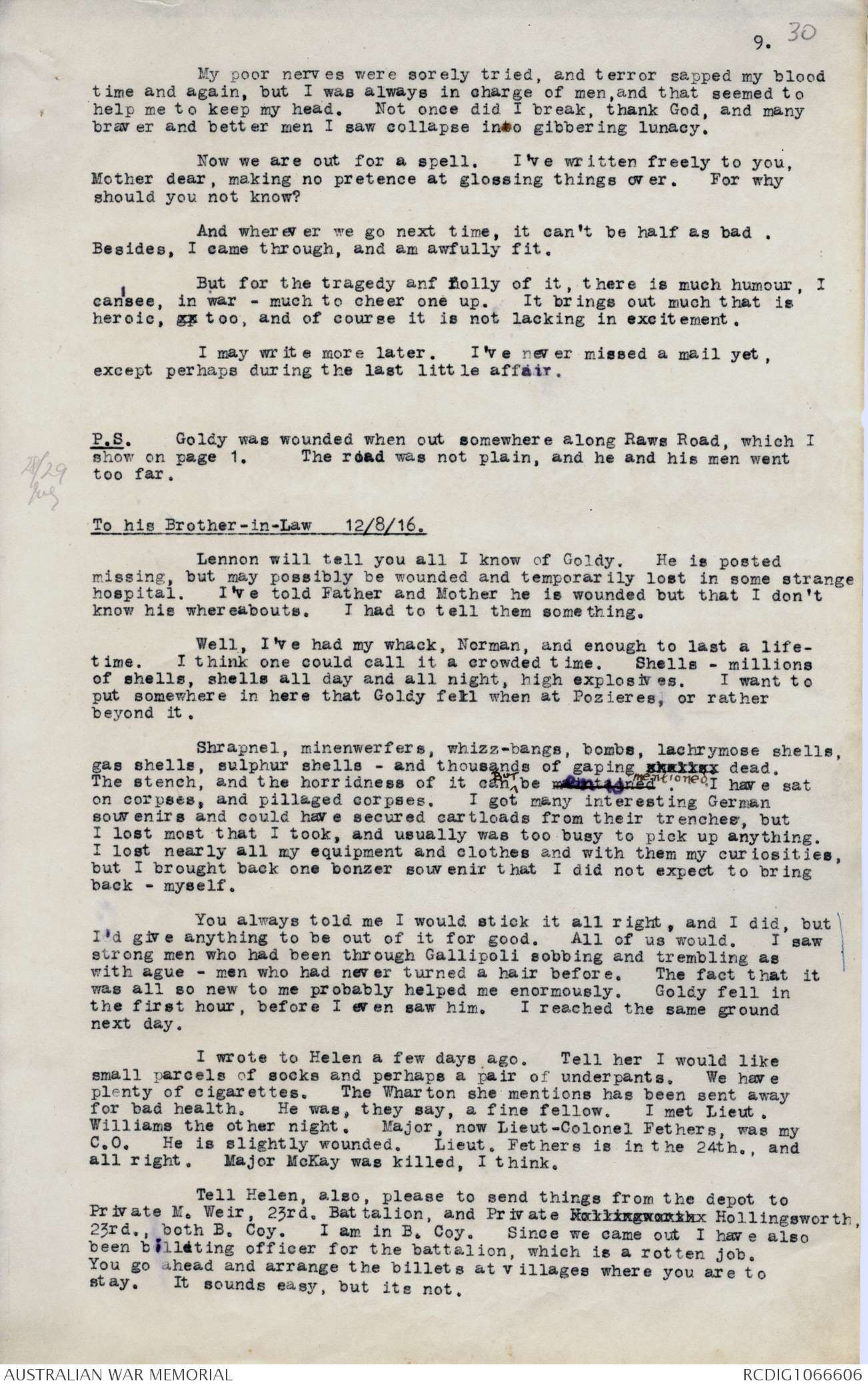
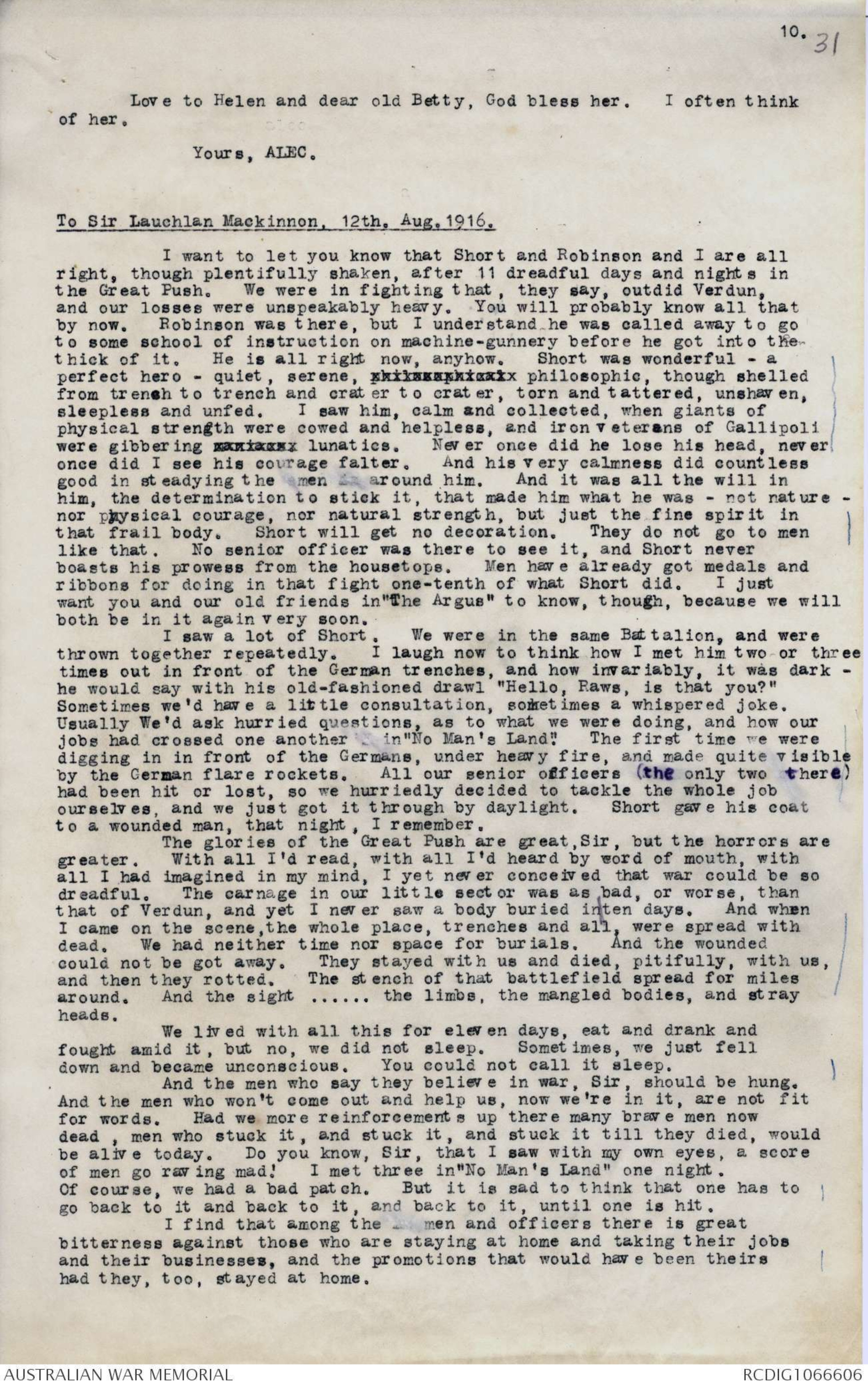
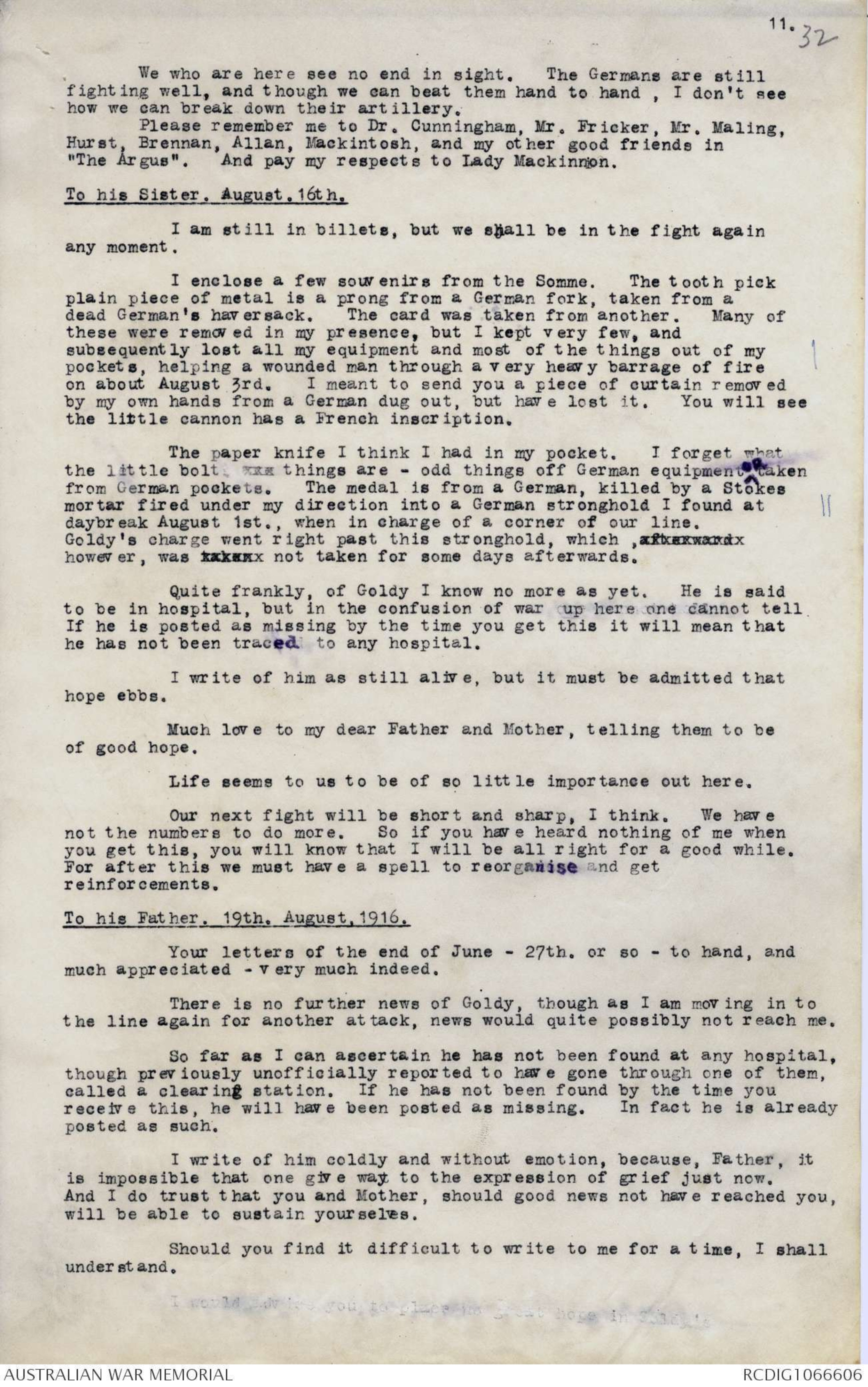
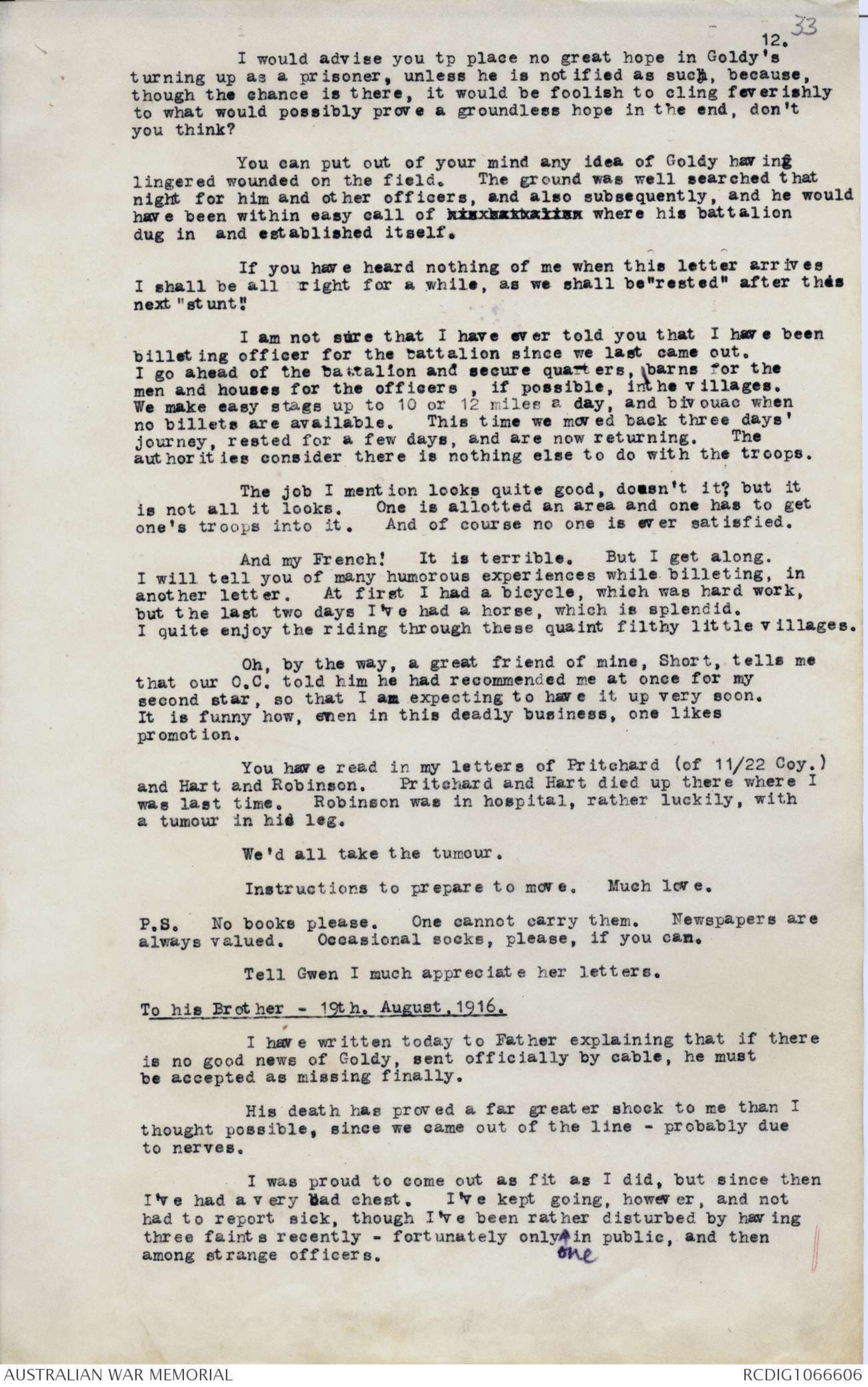
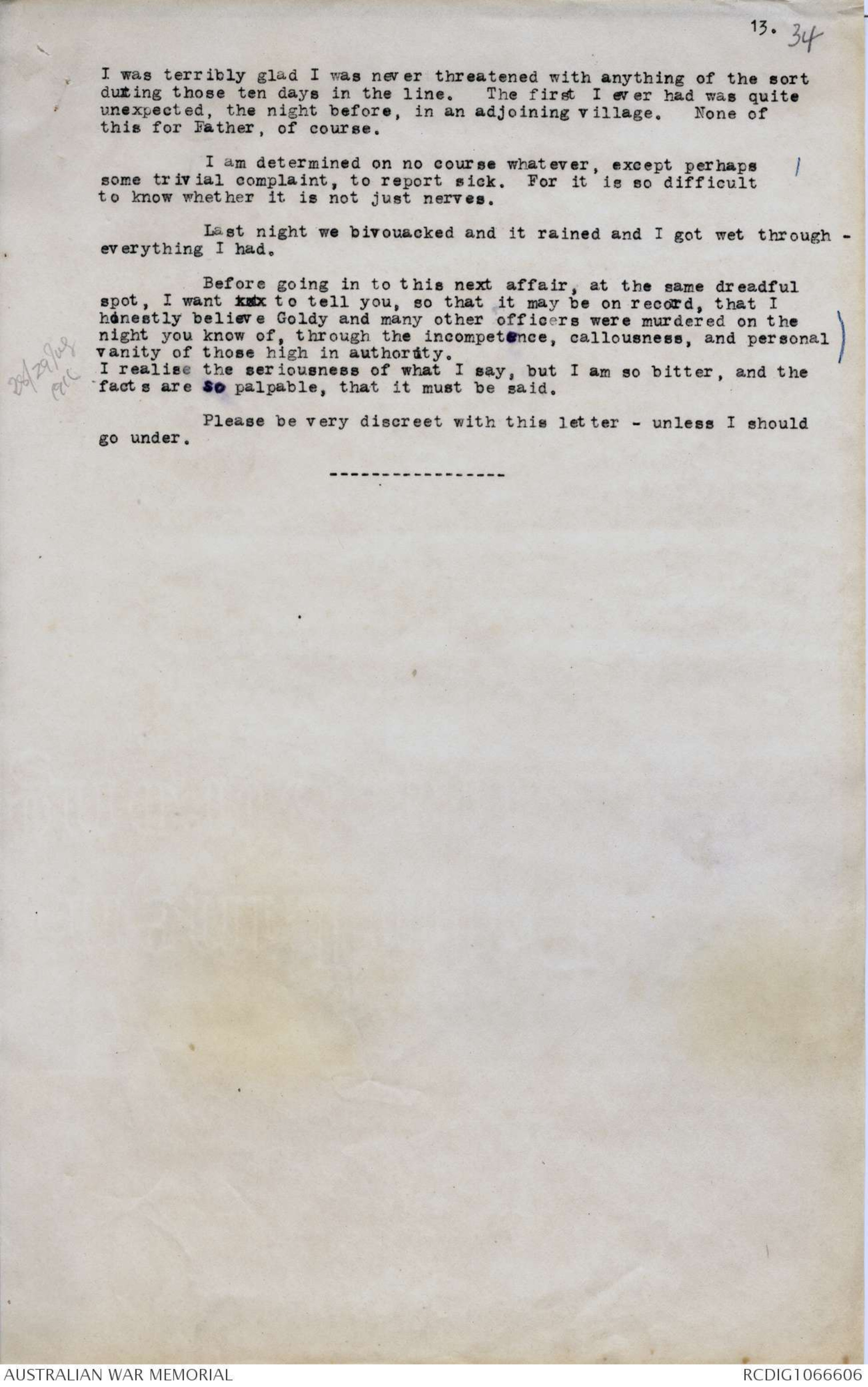
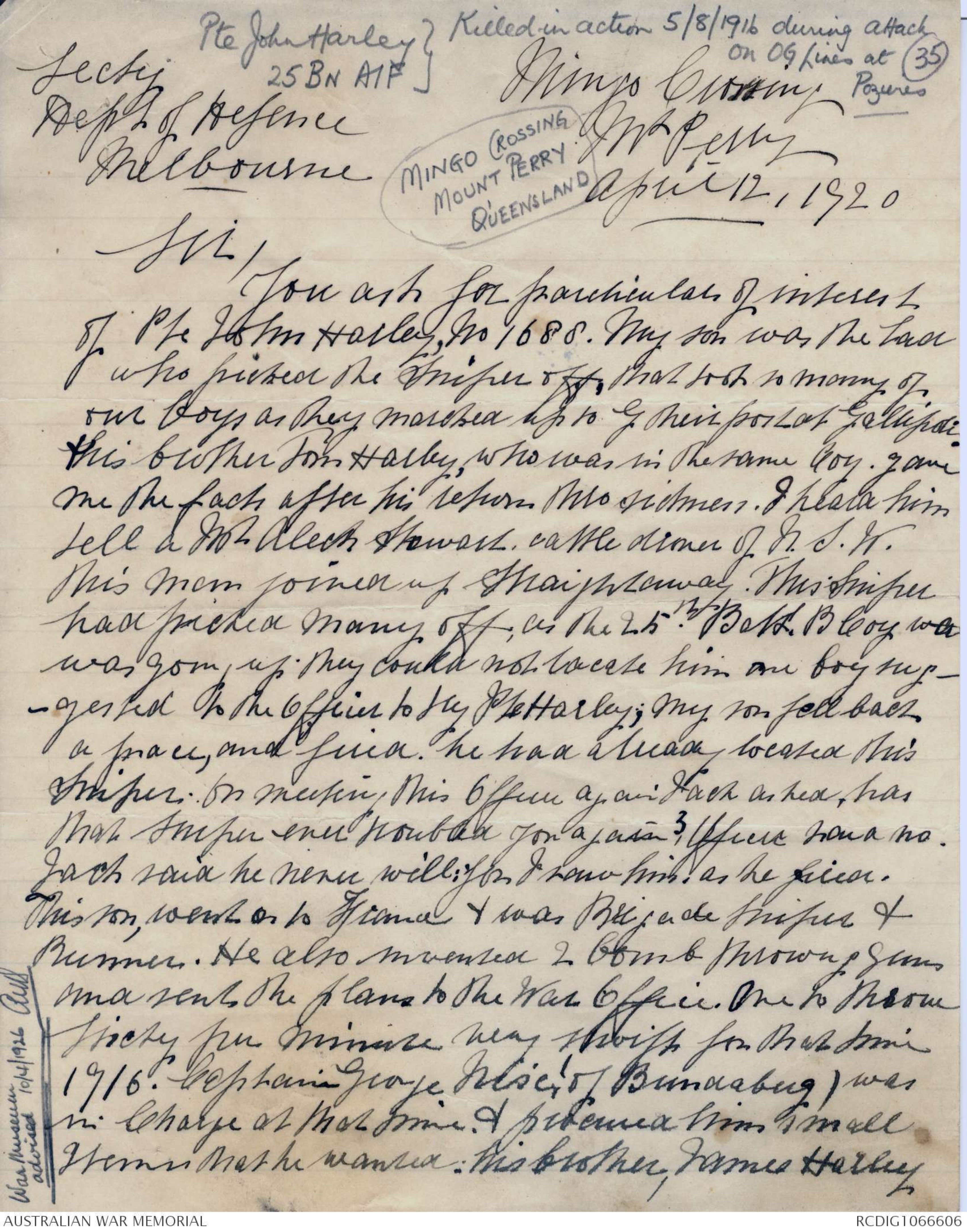
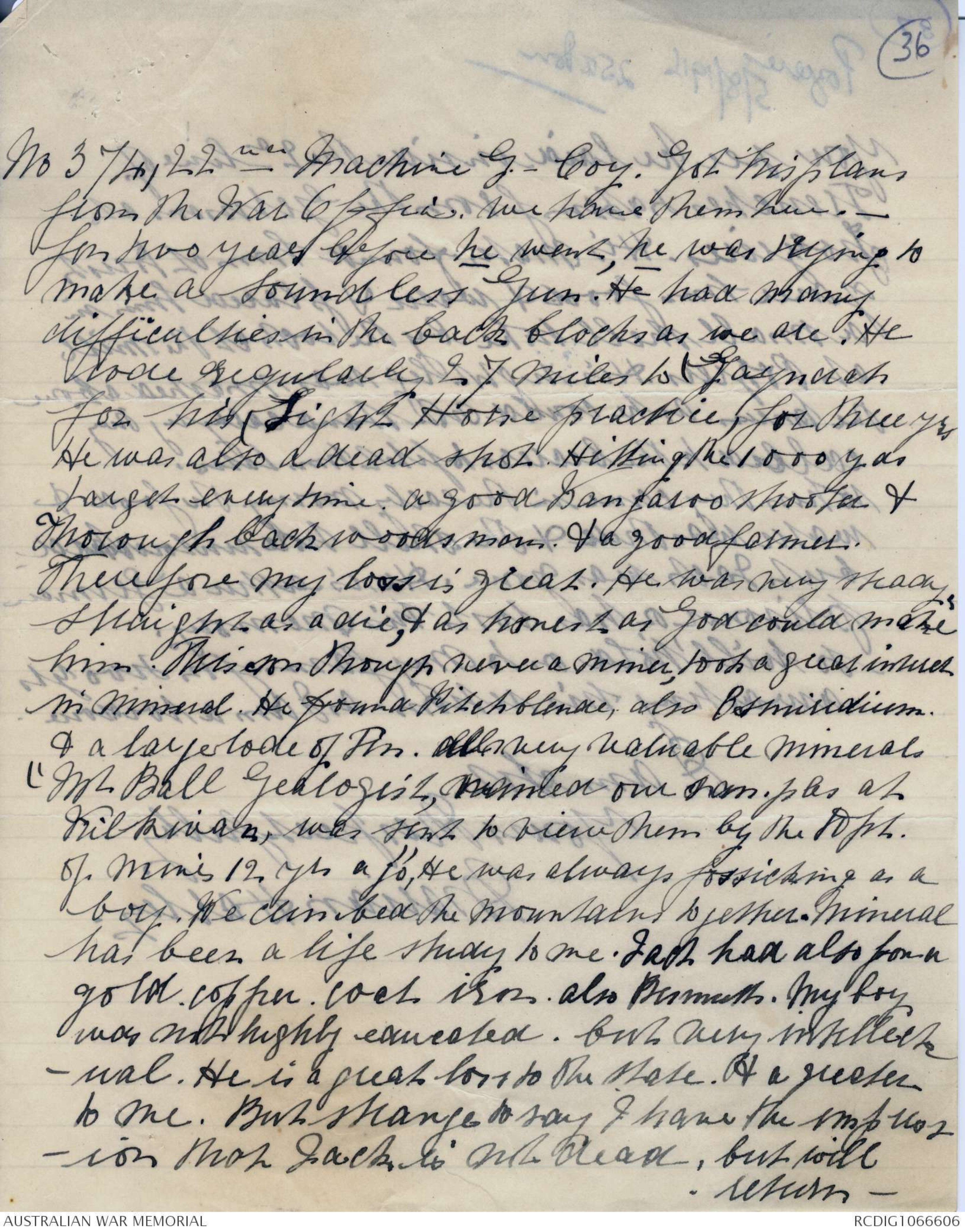
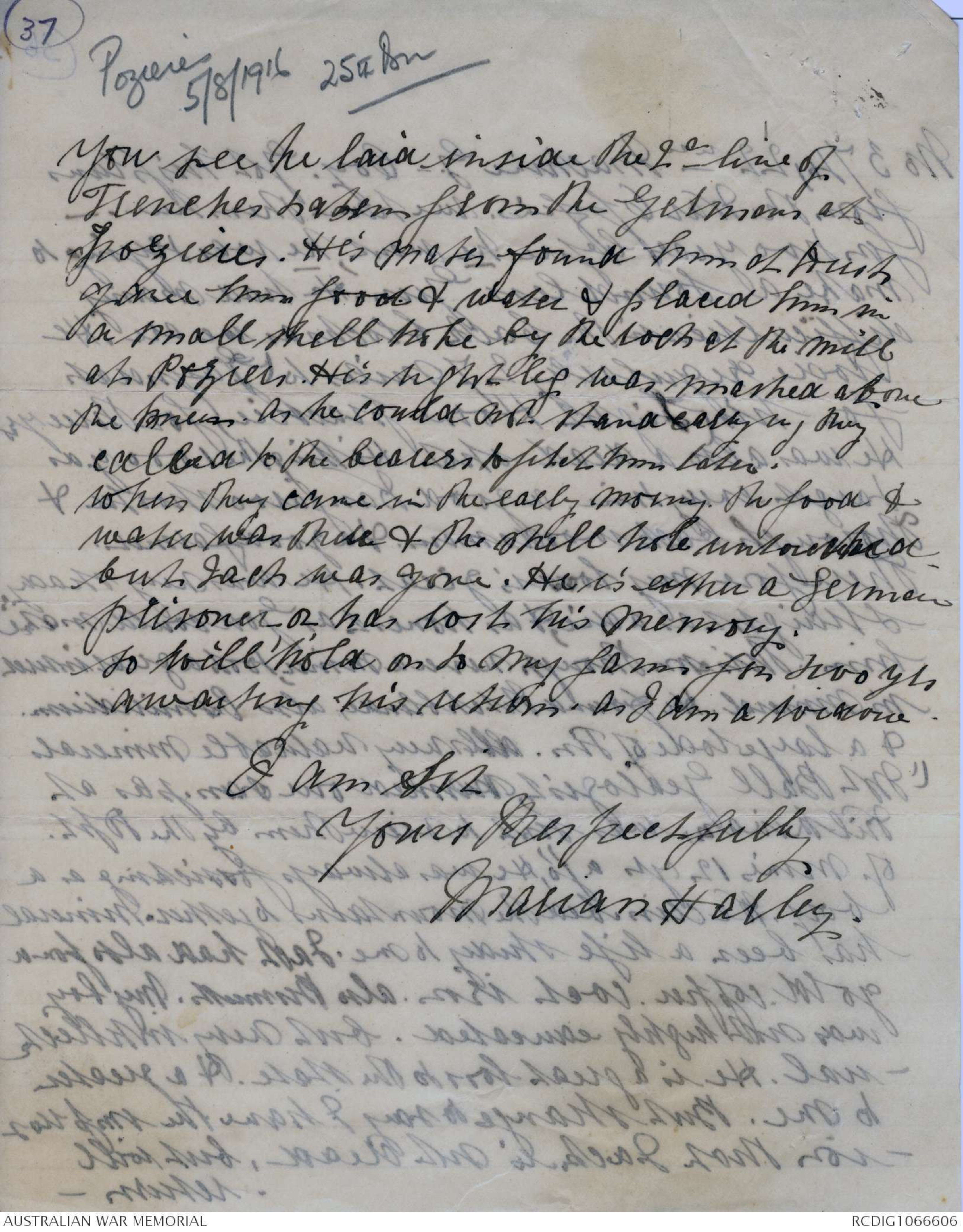
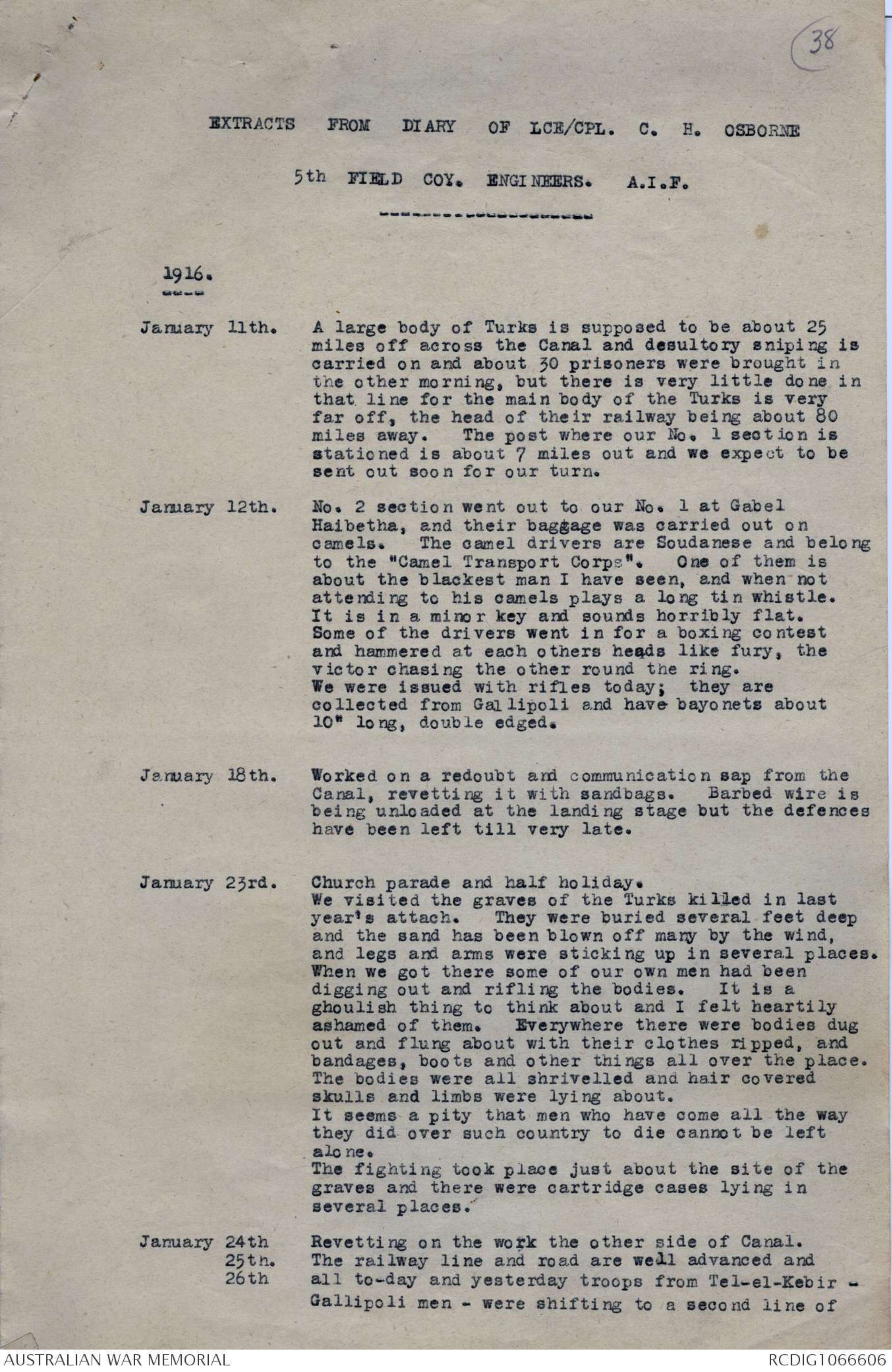
8. 29
And I believe the Authorities say that we are outdoing Verdun.
So you can see I had no very gentle baptism.
I was buried twice, just sort of half buried, and able to
wriggle out myself, much dazed and very frightened. Then I fell
down or was knocked down a dozen times. But I suffered nothing
but minor scratches.
We had practically no hand-to-hand fighting. The Germans
always ran. My nearest approach to that anything like that was
leading out a bombing party just before dawn to bomb out a German
[*?1/8/16*] stronghold just in front on our line at "A". We had to bear
continuous fire, mostly shells, but also machine guns, trench mortars,
bombs, and rifle bullets. We had no dug outs there at all, and
the trenches were not good. For two days and nights I was in a
trench like this :-
Diagram - see original document
On the right we were 350 or 400 yards away, but on the left only 40 yards.
All that time our shells were whizzing over our heads, and bursting on
the German lines or behind them, fired from all ranges, from 500 yards
back to six miles, and their noise, and the continual fear they might xxxx
short was indescribably trying. And of course sometimes they would
drop rather short. The Germans all the time shelled us, from three
different directions, because were out on a salient, and they
could command us from nearly all round.
Thus :-
Diagram - see original document
The crosses represent German lines, the dots ours. You can see how
they could shell us from their territory on three sides.
I never imagined that bombardments could be as bad as they are.
All we could do was to stand and tremble - we could hardly sit down
or lie down, as we were without dug outs, and the trenches were very
narrow - while the air rang with the shriek of shells, and the ground xx
shook as if upheaved by an earthquake, and the surface was torn and
tossed, thrown 50 feet in the air sometimes, by high explosives.
The shells approaching or passing over, sound for all the world like
railway trains, coming nearer and nearer, until they reach you or pass
you with a horrid shriek. But if you are below the surface, in a
trench, a shell has to lob right on to you to get you. That is how
so many of us escaped.
9. 30
My poor nerves were sorely tried, and terror sapped my blood
time and again, but I was always in charge of men, and that seemed to
help me to keep my head. Not once did I break, thank God, and many
braver and better men I saw collapse into gibbering lunacy.
Now we are out for a spell. I've written freely to you,
Mother dear, making no pretence at glossing things over. For why
should you not know?
And wherever we go next time, it can't be half as bad.
Besides, I came through, and am awfully fit.
But for the tragedy anf folly of it, there is much humour, I
can see, in war - much to cheer one up. It brings out much that is
heroic, gx too, and of course it is not lacking in excitement.
I may write more later. I've never missed a mail yet,
except perhaps during the last little affair.
P.S. Goldy was wounded when out somewhere along Raws Road, which I
show on page 1. The road was not plain, and he and his men went
too far.
[*28/29
Aug*]
To his Brother-in-Law 12/8/16.
Lennon will tell you all I know of Goldy. He is posted
missing, but may possibly be wounded and temporarily lost in some strange
hospital. I've told Father and Mother he is wounded but that I don't
know his whereabouts. I had to tell them something.
Well, I've had my whack, Norman, and enough to last a lifetime.
I think one could call it a crowded time. Shells - millions
of shells, shells all day and all night, high explosives. I want to
put somewhere in here that Goldy fell when at Pozieres; or rather
beyond it.
Shrapnel, minenwerfers, whizz-bangs, bombs, lachrymose shells,
gas shells, sulphur shells - and thousands of gaping shelle, dead.
The stench, and the horridness of it can ∧but be mentioned, mentioned. I have sat
on corpses, and pillaged corpses. I got many interesting German
souvenirs and could have secured cartloads from their trenches, but
I lost most that I took, and usually was too busy to pick up anything.
I lost nearly all my equipment and clothes and with them my curiosities,
but I brought back one bonzer souvenir that I did not expect to bring
back - myself.
You always told me I would stick it all right, and I did, but
I'd give anything to be out of it for good. All of us would. I saw
strong men who had been through Gallipoli sobbing and trembling as
with ague - men who had never turned a hair before. The fact that it
was all so new to me probably helped me enormously. Goldy fell in
the first hour, before I even saw him. I reached the same ground
next day.
I wrote to Helen a few days ago. Tell her I would like
small parcels of socks and perhaps a pair of underpants. We have
plenty of cigarettes. The Wharton she mentions has been sent away
for bad health. He was, they say, a fine fellow. I met Lieut.
Williams the other night. Major, now Lieut-Colonel Fethers, was my
C.O. He is slightly wounded. Lieut. Fethers is in the 24th., and
all right. Major McKay was killed, I think.
Tell Helen, also, please to send things from the depot to
Private M. Weir, 23rd. Battalion, and Private Hollingworthx Hollingsworth,
23rd., both B. Coy. I am in B. Coy. Since we came out I have also
been billeting officer for the battalion, which is a rotten job.
You go ahead and arrange the billets at villages where you are to
stay. It sounds easy, but its not.
10. 31
Love to Helen and dear old Betty, God bless her. I often think
of her.
Yours, ALEC.
To Sir Lauchlan Mackinnon, 12th. Aug. 1916.
I want to let you know that Short and Robinson and I are all
right, though plentifully shaken, after 11 dreadful days and nights in
the Great Push. We were in fighting that, they say, outdid Verdun,
and our losses were unspeakably heavy. You will probably know all that
by now. Robinson was there, but I understand he was called away to go
to some school of instruction on machine-gunnery before he got into the
thick of it. He is all right now, anyhow. Short was wonderful - a
perfect hero - quiet, serene philosophicxxx philosophic, though shelled
from trench to trench and crater to crater, torn and tattered, unshaven,
sleepless and unfed. I saw him, calm and collected, when giants of
physical strength were cowed and helpless, and iron veterans of Gallipoli
were gibbering xxxxxxx lunatics. Never once did he lose his head, never
once did I see his courage falter. And his very calmness did countless
good in steadying the xmen xx around him. And it was all the will in
him, the determination to stick it, that made him what he was - not nature -
nor physical courage, nor natural strength, but just the fine spirit in
that frail body. Short will get no decoration. They do not go to men
like that. No senior officer was there to see it, and Short never
boasts his prowess from the housetops. Men have already got medals and
ribbons for doing in that fight one-tenth of what Short did. I just
want you and our old friends in "The Argus" to know, though, because we will
both be in it again very soon.
I saw a lot of Short. We were in the same Battalion, and were
thrown together repeatedly. I laugh now to think how I met him two or three
times out in front of the German trenches, and how invariably, it was dark -
he would say with his old-fashioned drawl "Hello, Raws, is that you?"
Sometimes we'd have a little consultation, sometimes a whispered joke.
Usually We’d ask hurried questions, as to what we were doing, and how our
jobs had crossed one another in "No Man’s Land". The first time we were
digging in in front of the Germans, under heavy fire, and made quite visible
by the German flare rockets. All our senior officers (the only two there)
had been hit or lost, so we hurriedly decided to tackle the whole job
ourselves, and we just got it through by daylight. Short gave his coat
to a wounded man, that night, I remember,
The glories of the Great Push are great, Sir, but the horrors are
greater. With all I'd read, with all I’d heard by word of mouth, with
all I had imagined in my mind, I yet never conceived that war could be so
dreadful. The carnage in our little sector was as bad, or worse, than
that of Verdun, and yet I never saw a body buried in ten days. And when
I came on the scene, the whole place, trenches and all, were spread with
dead. We had neither time nor space for burials. And the wounded
could not be got away. They stayed with us and died, pitifully, with us,
and then they rotted. The stench of that battlefield spread for miles
around. And the sight . . . . the limbs, the mangled bodies, and stray
heads.
We lived with all this for eleven days, eat and drank and
fought amid it, but no, we did not sleep. Sometimes, we just fell
down and became unconscious. You could not call it sleep.
And the men who say they believe in war, Sir, should be hung.
And the men who won't come out and help us, now were in it, are not fit
for words. Had we more reinforcements up there many brave men now
dead, men who stuck it, and stuck it, and stuck it till they died, would
be alive today. Do you know, Sir, that I saw with my own eyes, a score
of men go raving mad! I met three in "No Man’s Land" one night.
Of course, we had a bad patch. But it is sad to think that one has to
go back to it and back to it, and back to it, until one is hit.
I find that among the xx men and officers there is great
bitterness against those who are staying at home and taking their jobs
and their businesses, and the promotions that would have been theirs
had they, too, stayed at home.
11. 32
We who are here see no end in sight. The Germans are still
fighting well, and though we can beat them hand to hand, I don't see
how we can break down their artillery.
Please remember me to Dr. Cunningham, Mr. Fricker, Mr. Maling,
Hurst, Brennan, Allan, Mackintosh, and my other good friends in
"The Argus". And pay my respects to Lady Mackinnon.
To his Sister. August. 16th.
I am still in billets, but we shall be in the fight again
any moment.
I enclose a few souvenirs from the Somme. The tooth pick
plain piece of metal is a prong from a German fork, taken from a
dead German's haversack. The card was taken from another. Many of
these were removed in my presence, but I kept very few, and
subsequently lost all my equipment and most of the things out of my
pockets, helping a wounded man through a very heavy barrage of fire
on about August 3rd. I meant to send you a piece of curtain removed
by my own hands from a German dug out, but have lost it. You will see
the little cannon has a French inscription.
The paper knife I think I had in my pocket. I forget what
the little bolt, xxx things are - odd things off German equipment ∧or taken
from German pockets. The medal is from a German, killed by a Stokes
mortar fired under my direction into a German stronghold I found at
daybreak August 1st., when in charge of a corner of our line.
Goldy's charge went right past this stronghold, which afterwardx
howev er, was takenx not taken for some days afterwards.
Quite frankly, of Goldy I know no more as yet. He is said
to be in hospital, but in the confusion of war up here one cannot tell
If he is posted as missing by the time you get this it will mean that
he has not been traced to any hospital.
I write of him as still alive, but it must be admitted that
hope ebbs.
Much love to my dear Father and Mother, telling them to be
of good hope.
Life seems to us to be of so little importance out here.
Our next fight will be short and sharp, I think. We have
not the numbers to do more. So if you have heard nothing of me when
you get this, you will know that I will be all right for a good while.
For after this we must have a spell to reorganise and get
reinforcements.
To his Father. 19th. August, 1916.
Your letters of the end of June - 27th. or so - to hand, and
much appreciated - very much indeed.
There is no further news of Goldy, though as I am moving in to
the line again for another attack, news would quite possibly not reach me.
So far as I can ascertain he has not been found at any hospital,
though previously unofficially reported to have gone through one of them,
called a clearing station. If he has not been found by the time you
receive this, he will have been posted as missing. In fact he is already
posted as such.
I write of him coldly and without emotion, because, Father, it
is impossible that one give way to the expression of grief just now.
And I do trust that you and Mother, should good news not have reached you
will be able to sustain yourselves.
Should you find it difficult to write to me for a time, I shall
understand.I would advise you to place no great hope in Goldy’s
12. 33
I would advise you tp place no great hope in Goldy’s
turning up as a prisoner, unless he is notified as such, because,
though the chance is there, it would be foolish to cling feverishly
to what would possibly prove a groundless hope in the end, don't
you think?
You can put out of your mind any idea of Goldy having
lingered wounded on the field. The ground was well searched that
night for him and other officers, and also subsequently, and he would
have been within easy call of his battalion where his battalion
dug in and established itself.
If you have heard nothing of me when this letter arrives
I shall be all right for a while, as we shall be "rested" after this
next "stunt."
I am not sure that I have ever told you that I have been
billeting officer for the battalion since we last came out.
I go ahead of the battalion and secure quarters, barns for the
men and houses for the officers, if possible, in the villages.
We make easy stags up to 10 or 12 miles a day, and bivouac when
no billets are available. This time we mov ed back three days'
journey, rested for a few days, and are now returning. The
authorities consider there is nothing else to do with the troops.
The job I mention looks quite good, doesn't it? but it
is not all it looks. One is allotted an area and one has to get
one's troops into it. And of course no one is ever satisfied.
And my French! It is terrible. But I get along.
I will tell you of many humorous experiences while billeting, in
another letter. At first I had a bicycle, which was hard work,
but the last two days I've had a horse, which is splendid.
I quite enjoy the riding through these quaint filthy little villages
Oh, by the way, a great friend of mine, Short, tells me
that our O.C. told him he had recommended me at once for my
second star, so that I am expecting to have it up very soon.
It is funny how, even in this deadly business, one likes
promotion.
You have read in my letters of Pritchard (of 11/22 Coy.)
and Hart and Robinson. Pritchard and Hart died up there where I
was last time. Robinson was in hospital, rather luckily, with
a tumour in his leg.
We’d all take the tumour.
Instructions to prepare to more. Much love.
P.S. No books please. One cannot carry them. Newspapers are
always valued. Occasional socks, please, if you can.
Tell Gwen I much appreciate her letters.
To his Brother - 19th. August, 1916.
I have written today to Father explaining that if there
is no good news of Goldy, sent officially by cable, he must
be accepted as missing finally.
His death has proved a far greater shock to me than I
thought possible, since we came out of the line - probably due
to nerves.
I was proud to come out as fit as I did, but since then
I've had a very bad chest. I've kept going, however, and not
had to report sick, though I've been rather disturbed by having
three faints recently - fortunately only ^one in public, and then
among strange officers.
13. 34
I was terribly glad I was never threatened with anything of the sort
during those ten days in the line. The first I ever had was quite
unexpected, the night before, in an adjoining village. None of
this for Father, of course.
I am determined on no course whatever, except perhaps
some trivial complaint, to report sick. For it is so difficult
to know whether it is not just nerves.
Last night we bivouacked and it rained and I got wet through -
everything I had.
Before going in to this next affair, at the same dreadful
spot, I want xxx to tell you, so that it may be on record, that I
honestly believe Goldy and many other officers were murdered on the
night you know of, through the incompetence, callousness, and personal
vanity of those high in authority.
[*28/29 Aug
1916*] I realise the seriousness of what I say, but I am so bitter, and the
facts are so palpable, that it must be said.
Please be very discreet with this letter - unless I should
go under.
35
[*Pte John Harley 25BN AIF Killed in action 5/8/1916 during attack
on OG Lines at Pozieres*]
Secty
Dept of Defence
Melbourne
Mingo Crossing
Mt Perry
April 12, 1920
[*MINGO CROSSING
MOUNT PERRY
QUEENSLAND*]
Sir,
You ask for particulars of interest
of Pte John Harley, No 1688. My son was the lad
who picked the sniper off, that took so many of
our boys as they marched up to [[G?]] their post at Gallipoli.
His brother Tom Harley, who was in the same Coy. gave
me the facts after his return from sickness. I heard him
tell a Mr Alech Stewart, cattle drover of N.S.W.
this man joined up straight away. This Sniper
had picked many off, as the 25th Batt. B Coy was
was going up they could not locate him one boy
suggested to the officer to try Pte Harley; my son fell back
a pace, and fired. he had already located this
Sniper. On meeting this Officer again Jack asked, has
that Sniper ever troubled you again? Officer said no.
Jack said he never will; for I saw him: as he fired.
This son, went on to France & was Brigade Sniper &
Runner. He also invented 2 bomb throwing guns
and sent the plans to the War Office. One to throw
Sixty per minute very swift for that time
1916. Captain George [[Wisely?]] of Bundaberg) was
in Charge at that time. & secured him small
items that he wanted. His brother, James Harley
[*War Museum
advised 10/4/26 AWB*]
36
No 374, 22nd Machine G.- Coy. Got his plans
from the War Office. We have them here. -
for two years before he went, he was trying to
make a Soundless Gun. He had many
difficulties in the back blocks as we are. He
rode regularly 27 miles to Gayndah
for his Light Horse practice, for three yrs
He was also a dead shot. Hitting the 1000 yds
target every time. A good Kangaroo shooter &
thorough backwoods man. & a good farmer.
Therefore my loss is great. He was very steady,
straight as a die, & as honest as God could make
him. This son though never a miner, took a great interest
in Mineral. He found Pitchblende, also Osmiridium.
& a large lode of Tin. All very valuable minerals
"Mr Ball Geologist, viewed our samples at
Kilkivan, was sent to view them by the Dpt.
of Mines 12 yrs ago", He was always fossicking as a
boy. We climbed the mountains together. Mineral
has been a life study to me. Jack had also found
gold. copper. coal iron. also Bismuth. My boy
was not highly educated. but very intellectual.
He is a great loss to the state. & a greater
to me. But strange to say I have the impression
that Jack is not dead, but will
return -
37
[*Pozieres
5/8/1916
25th Bn*]
you see he laid inside the 2nd line of
trenches taken from the Germans at
Pozieres. His mates found him on dusk
gave him food & water & placed him in
a small shell hole by the back of the mill
at Pozieres. His right leg was smashed above
the knee. As he could not stand easily, they
called to the bearers to fetch him later.
When they came in the early morning th food &
water was there & shell hole untouched
but Jack was gone. He is either a German
prisoner or has lost his memory.
So will hold on to my farm for two yrs
awaiting his return. As I am a widow.
I am Sir
Yours respectfully
Marian Harley.
38
EXTRACTS FROM DIARY OF LCE/CPL. C. H. OSBORNE
5th FIELD COY. ENGINEERS. A.I.F.
1916.
January 11th. A large body of Turks is supposed to be about 25
miles off across the Canal and desultory sniping is
carried on and about 30 prisoners were brought in
the other morning, but there is very little done in
that line for the main body of the Turks is very
far off, the head of their railway being about 80
miles away. The post where our No. 1 section is
stationed is about 7 miles out and we expect to be
sent out soon for our turn.
January 12th. No. 2 section went out to our No. 1 at Gabel
Haibetha, and their baggage was carried out on
camels. The camel drivers are Soudanese and belong
to the "Camel Transport Corps". One of them is
about the blackest man I have seen, and when not
attending to his camels plays a long tin whistle.
It is in a minor key and sounds horribly flat.
Some of the drivers went in for a boxing contest
and hammered at each others heads like fury, the
victor chasing the other round the ring.
We were issued with rifles today; they are
collected from Gallipoli and have bayonets about
10" long, double edged.
January 18th. Worked on a redoubt and communication sap from the
Canal, revetting it with sandbags. Barbed wire is
being unloaded at the landing stage but the defences
have been left till very late.
January 23rd. Church parade and half holiday.
We visited the graves of the Turks killed in last
year's attach. They were buried several feet deep
and the sand has been blown off many by the wind,
and legs and arms were sticking up in several places.
When we got there some of our own men had been
digging out and rifling the bodies. It is a
ghoulish thing to think about and I felt heartily
ashamed of them. Everywhere there were bodies dug
out and flung about with their clothes ripped, and
bandages, boots and other things all over the place.
The bodies were all shrivelled and hair covered
skulls and limbs were lying about.
It seems a pity that men who have come all the way
they did over such country to die cannot be left
alone.
The fighting took place just about the site of the
graves and there were cartridge cases lying in
several places.
January 24th Revetting on the work the other side of Canal.
25th. The railway line and road are well advanced and
26th all to-day and yesterday troops from Tel-el-Kebir -
Gallipoli men - were shifting to a second line of
 Maralyn K
Maralyn KThis transcription item is now locked to you for editing. To release the lock either Save your changes or Cancel.
This lock will be automatically released after 60 minutes of inactivity.